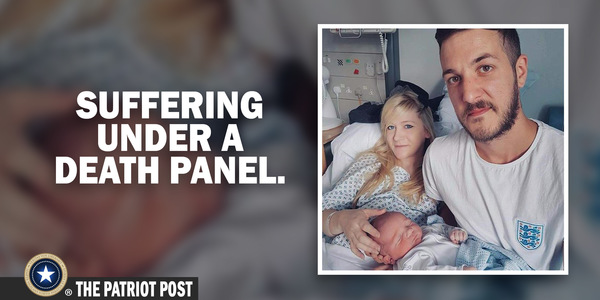An infant in England is suffering and socialized medicine won’t fix it. In fact, doctors want him to die.
“I’m more than ever of the opinion that a decent human existence is possible today only on the fringes of society.” —Hannah Arendt
Eleven-month-old Charlie Gard was born perfectly healthy on Aug. 4, 2016. Tragically in September, he became1 only the sixteenth person in the world diagnosed with mitochondrial DNA depletion syndrome, a condition2 that causes progressive muscle weakness, brain damage and is typically fatal in infancy or early childhood. What he and his parents have endured since then reveals that decent human existence and Western culture have become estranged from each other.
In January 2017, Charlie’s mother, Connie Yates, found an American doctor willing to offer Charlie a trial treatment known as nucleoside therapy. The treatment is very expensive, so Connie and her husband, Chris Gard, set up a crowdfunding page3 with the goal of raising $1.56 million. The page was set up on Jan 20. As of last Friday, a whopping 83,434 people had contributed more than $1.7 million to the fund, enough money to allow Charlie to travel to America by air ambulance and receive treatment. “We strongly feel as his parents that Charlie should get a chance to try these medications,” Connie wrote on the page. “He literally has nothing to lose but potentially a healthier, happier life to gain.”
Shortly thereafter, the couple’s descent into socialist hell began.
Specialists at Great Ormond Street Hospital for Children in London (GOSH), where Charlie is on life support, insisted4 the experimental treatment would not help the boy. Thus he must be taken off life support and allowed to “die with dignity.” The doctors asked a British court to rule that it is legal to do so.
Last April 11, Justice Nicholas Francis, expressing5 the “heaviest of hearts” but “complete conviction,” ruled in the specialists’ favor. There were shouts of “no” from the crowd and both parents wept. Connie stated6 that she and Chris were now facing “every parent’s worst nightmare,” while their attorney Laura Hobey-Hamsher insisted the couple is “struggling to understand why the court has not at least given Charlie the chance of treatment in America. The medical evidence is complex, and the treatment offered, potentially ground-breaking.”
Francis disagreed, siding with the specialists and another team of doctors in Barcelona who all agreed Charlie’s brain function “cannot be improved.”
The parents made known their intention to appeal the case so, it was ruled Charlie could be kept on life support an additional three weeks. Within 11 days of that decision, more than 110,000 people signed a petition calling for a letter-writing campaign asking the Prime Minister to order Charlie’s release from the hospital.
Regardless, on May 25, Lord Justice McFarlane, Lady Justice King and Lord Justice Sales of the Court of Appeals upheld7 Francis’ ruling. The parents’ attorney, Richard Gordon QC, noted the “very serious issues” raised by the decision, rightfully insisting what was really at stake in the case is “the State, on a massive scale, intruding in your right to private and family life.”
The parents remained undeterred and the case ended up before the Supreme Court. On June 9, a panel of three Supreme Court justices also rejected8 the parents challenge, but required Great Ormond Street Hospital to keep Charlie on life support for another 24 hours to give the European Court of Human Rights (ECHR) the chance to consider the case. After the decision was announced Yates wept and asked, “How could they do this to us?”
On June 13, judges in Strasbourg, France granted9 the parents a six day reprieve, so their case could be filed and reviewed by the ECHR. That order was subsequently extended when the ECHR decided to hear the case.
It was all for naught. On June 27, the ECHR ruled the British courts were correct, the parents application was “inadmissible” — and its decision was “final.”
A GOSH spokesman issued10 a statement. “Our thoughts are with Charlie’s parents on receipt of this news which we know will be very distressing for them. Today’s decision by the European Court of Human Rights marks the end of what has been a very difficult process and our priority is to provide every possible support to Charlie’s parents as we prepare for the next steps. There will be no rush by Great Ormond Street Hospital to change Charlie’s care and any future treatment plans will involve careful planning and discussion.”
Connie Yates cut through the contemptuous assertions about process, priorities and planning. “We just can’t let our baby die when there is something that might help him!” she said. “We won’t give up on him because he has a rare disease.”
Maybe not, but the UK and EU will. “Whether you blame socialized medicine or soaring secularization, it’s no secret that European medicine and law hold ever-less respect for life,” the New York Post editorial board states11.
Why choose? Both aspects have pushed decent human existence to the fringes of a society where parental rights are now subservient to the State — and where the “sanctity of life” and “cost cutting measures” are becoming interchangeable terms.
And no matter how the judges, the doctors, and the politicians try to cast this as a humane decision, forcing an infant to “die with dignity,” lest he possibly invalidate expert opinion is the epitome of moral bankruptcy.
And no one knows it2 better than Arthur and Olga Estopinan, whose child, Arturito, was diagnosed with a condition similar to Charlie’s — and who became the first person in America to undergo nucleoside therapy. “We saw a difference in our son in just three months,” Arthur explained. He further revealed there were “no side effects either and after a year on the experimental medications he was well enough to come home.”
Charlie will never come home. “Our parental rights have been stripped away. We can’t even take our own son home to die, Chris Gard explained1. “We’ve been denied that. Our final wish if it all went against us can we take our little boy home to die and we are not allowed. They even said no to a hospice.”
Charlie was supposed to be taken off life support last Friday, but one suspects the publicity surrounding this case engendered a temporary reprieve. GOSH issued a statement saying “together with Charlie’s parents we are putting plans in place for his care and to give them more time together as a family.”
The Estopinans, who were in “constant contact” with Charlie’s parents, have much more time to spend together as a family. While their son requires constant care from a team of nurses, he is growing stronger. Moreover, he can communicate with “shakes of his head and clicks of his tongue, which mean ‘I want more,’” Olga explained.
Father Arthur couldn’t be happier. “We feel very fortunate to be American and not British,” he said, “because if we lived in the UK Arturito would surely be dead by now.”
That good fortune may be ephemeral. More and more Americans are becoming equally besotted by socialized medicine, soaring secularization, and “death with dignity,” even as they claim to be horrified by the idea of “death panels.”
Nevertheless, a panel of doctors, abetted by the courts, have obliterated parental rights.
Hope itself? Relegated to the fringes of society.







